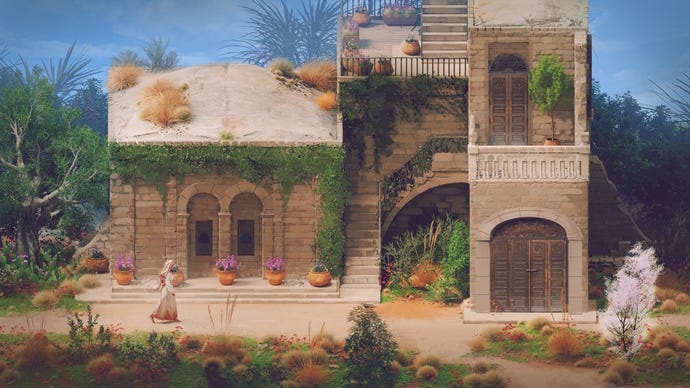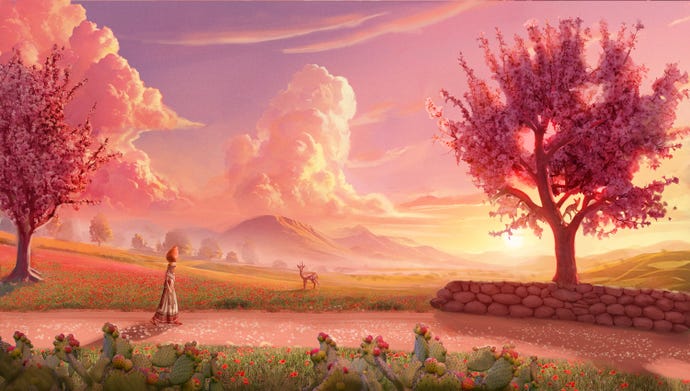“I sometimes joke about it, but it’s like I need a war to start a new game,” Rasheed Abu-Eideh tells me over a call. “The specific thing that made me make Liyla And The Shadows Of War is the attacks on Gaza in 2014, and the specific thing that made me make Dreams On A Pillow is the attacks on Gaza in 2023.”
Dreams On A Pillow is a stealth adventure that tells the story of a young mother during the Nakba – the 1948 ethnic cleansing, displacement, and cultural suppression of Palestinian Arabs by Israel. As its funding campaign puts it, it’s a game about “a land full of people being made into a people without land.”
The campaign still has a few days to go, but surpassed its initial goal earlier this week. Abu-Eideh says the reaction has been overwhelming. “I know people care,” he says, but he never expected so much support, and so many kind words. The funding launched with the acknowledgement that he’d need more than twice the goal to fully “pay for salaries, outsourcing, and asset creation”. But this does mean he and a small team of artists, calligraphers, and coders can begin production.
“We needed talented people who believed in this project,” Abu-Eideh says. “That’s like the basic requirement for something like this, because it’s not a normal project. You need people that believe in your cause”. While the team and he prepare to move on from pre-production, I ask what his day-to-day currently looks like from his home in the West Bank.
“It’s very hard, daily life. Just taking your kids to the school is a big deal because you don’t know which road you should take. You don’t know where the checkpoints are and if they’re going to block the roads today or not. On a daily basis, there are multiple attacks in different villages in cities by the soldiers or by the settlers. Burning houses. Cutting trees and burning trees. Destroying the main roads. So it’s kind of the daily hustle that we live in.”
“We’re seeing the increasing speed of the settlements growing around us and taking more land,” he continues, “occupying more of our land and making into settlements. So it’s kind of not safe at all just to move around. There are always attacks or things like that in the main cities. Sometimes you can just be in a road and you see an ambulance, but somehow this ambulance turns into special Israeli forces sneaking your into city. Kidnapping someone or assassinating someone. So, it’s like…terrible. It’s terrible, actually.”
Omm, the oral folktale that Dreams On A Pillow is based on, is widely known in Palestine. “I knew it from a young age. People usually use it to show how the Nakba was a terrible event. There are many stories about the Nakba and Palestine, but I think this story by itself captured the emotions that I want. It shows actually the suffering of the Palestinian. Both the physical suffering and the emotional suffering from what happened to them in 1948.”

Dreams On A Pillow’s young mother has fled her home after the murder of her husband, accidentally grabbing a pillow instead of her child. The pillow remains a source of comfort, but she won’t be able to interact as freely with the world until she puts it down. Abu-Eideh says he wants to make sure the game offers a “complete harmony” between this story and its gameplay, rather than having these elements pull in opposite directions.
“Merging them was essential. The pillow itself is the secure object. When she holds the pillow, she’s somehow safe in her mind. But still, the environment around her is very dangerous. When she puts the pillow down to solve a puzzle, to move something, she will lose that security. She’ll start seeing the nightmares around her.”
“It’s the emotional aspect of the Nakba itself,” he continues, “which shows not only the normal danger that Palestinians have, but also the psychological impact of losing their dream. The Palestinian did not only lose their homes and their land, but they also lost everything. They lost their memories, their history and their future.”
Abu-Eideh first got into game design through studying computer engineering, which turned into a job. “Until like 2010, when there’s a huge trend for mobile apps, the expansion of the App Store and Google Play, things like that. There was the new platforms you can actually use to make games. I started playing with these things, and discovered that I love making games. From there, I was inspired to read and to study more. About not only game development but also game design”. He says he loves games like Limbo, The Walking Dead, Shadow Of The Colossus and The Last Of Us, games with “a heavy story”.
Platforms like Google Play have historically not recognised his region as existing
Apple’s App Store would later play a much different role in Abu-Eideh’s journey as a designer. In 2016, they rejected Liyla And The Shadows Of War from their ‘games’ category, telling him that “it would be more appropriate to categorize your app in News or Reference for example”. Abu-Eideh felt this was a decision based on the political content of Liyla – which centers a Palestinian family facing armed attacks in 2014 Gaza. Public backlash followed, and the App Store reversed their decision.
But this isn’t the only obstacle Abu-Eideh and other Palestinian developers face. As he mentions in Miziziziz’s 2022 video, platforms like Google Play have historically not recognised his region as existing, making connecting to payment gateways difficult. Which is why Dreams On A Pillow is being crowdfunded via LaunchGood, a platform founded on the principle that “Muslims have incredible stories to tell”.

“I think we’re lucky that we have LaunchGood, because I couldn’t do it on any different platform. It’s the same problem. They do not recognise this region at all. I’m not sure if they are willing to support a project like this, or at least to put it on their platform. But luckily, we have a crowdfunding platform focused more on the Middle East. They have their ways to overcome the obstacles, for the creative people, for any campaign on their website.”
Liyla And The Shadows Of War was a “great success”, Abu-Eideh says. He spoke at GDC in 2017. He wanted to turn the exposure the game brought into a career. He first started work on Dreams On A Pillow the same year, but couldn’t reach a point where it became sustainable. “I dropped that project many times. Life here is difficult. You focus on the basic things more than any other thing. You need to survive on a daily basis. You need to provide for your family and you have no security at all. At that time, I wanted to do something that at least I can sustain my life somehow. And maybe, if I can, I will come back to this game.”
“I can remember many nights when I am coding for Lilya, I was coding with my tears”
Abu-Eideh opened a nut roastery near his hometown to support his family, while continuing work on small game projects. Roasted cashews, pistachios, and watermelon seeds were most popular, he tells me, but people would often buy almonds too. There’s a traditional Palestinian dish named Msakhan that uses lots of them, alongside sumac chicken and caramelized onion flatbread. He makes it sound unbearably delicious.
“Today,” reads the funding campaign, his roastery “sits empty” due to travel to the business being unsafe. “With what’s happening right now,” Abu-Eideh tells me, “I thought, like, I should do this. Because I feel now I’m more responsible, and that I have a responsibility to do this. It’s more of a duty. Something that I have to do.”
“When you do something authentic, and when you express yourself in a game, and when you show a personal experience, people will react to it. People will feel it. I had this idea that games have a power before I released Liyla. But after I released the game, I saw that as a fact. It’s not a theory anymore for me. So when you put your emotion in your game, in your thing, people will feel it. I don’t know how, but we feel it. I can remember many nights when I am coding for Lilya, I was coding for Lilya. I was like, coding with my tears. So I think that somehow turned into something that people felt while they are playing later.”

I finish the interview by asking Abu-Eideh if there’s something he wishes more people knew about Palestine’s game making scene.
“You know, this is like the personal story for me, trying to make games as a reflection of the reality here in Palestine. Many, many talented students here want to make games, but it’s not possible. It’s not that easy. Yesterday, I was giving a session for students from Palestine, and some of them in Gaza. They were asking me, ‘how can we make games with lots happening around us. There is a barrier for everything. There is a barrier for life. How can we do this?'”
“So I think that the lack of game studios we have here in Palestine,” he continues, “is because people just want the basic things in life, and there is not much room for trial and error. Making games is not an easy job. You need to experiment many things, and you have to make many iterations to reach something that is beautiful and people can actually enjoy. And to do this, you need an ecosystem that helps you. You need publishers, you need investors. You need to build your talent. You need connections.”
“And all of that is blocked in Palestine. Many of them are just trying because they love the medium, but they are trying by themselves in their free time. There was many, many attempts to create studios here in Palestine, but all of them did not work out.”
Dreams On A Pillow’s LaunchGood campaign runs until January 13th.









Add comment